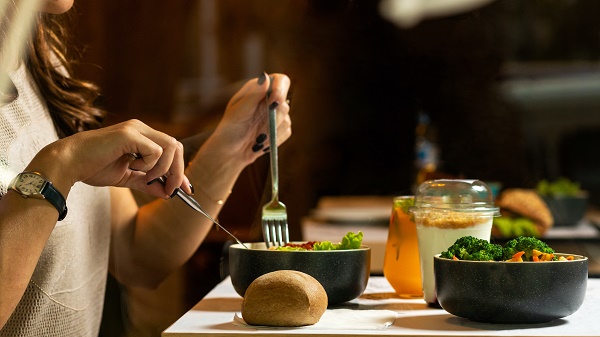Eating well and cancer
As a carer, you want to do your best for those you look after, including ensuring they eat well.
When caring for someone with cancer, it is helpful to understand which types of food and drinks could provide benefits and help them feel more resilient. We have provided some simple suggestions of ways to support someone with the challenges they might face. Below, we offer some guidance and tips to help.

If you care for someone with cancer, you may be aware that their eating habits have changed since they were diagnosed. Over time, they may find it more difficult to drink and eat certain foods.
Eating well can help with:
- maintaining your weight
- gaining energy
- coping better with the side-effects of cancer treatment
- tolerating the most beneficial dose of certain cancer treatments
- fighting infection and recovering faster from surgery.
When you have cancer, you can lose your appetite which can lead to losing weight. There are many reasons for this; it could be as a result of the cancer itself or due to the side-effects of the different treatments.
If you are worried the person you care for is losing weight and struggling to eat, it is important to speak to your GP or another healthcare professional.
During and after cancer treatment, some people experience unpleasant side-effects that can cause eating problems. Sometimes changes in appetite, taste or smell can put people off their food temporarily.
Side-effects could include a range of states from nausea to dehydration, to feelings of low mood or depression, all of which can affect your appetite.
There are some practical tips to help someone improve their nutritional intake here.
Ways to stimulate someone’s appetite
Here are some suggestions:
- Be flexible with mealtimes and make the most of ‘good eating times.’ Different people will have more of an appetite at certain times of the day, whether this is breakfast or teatime.
- Offer small portions of food, more frequently throughout the day.
- Try not to overload the plate with too much food and have a gap between the main meal and dessert.
- Include foods that are both familiar to the person and also new, adventurous foods that they may not have had before.
- Make meals look appetising and eye-catching by including different colours, such as herbs and spices, a bowl of chopped fruit or mixed vegetables.
A healthy, balanced diet is vital for us all. Enjoying foods from all the different food groups is important to provide the body with all the nutrients it needs.
Studies have shown that certain combinations of nutrients may help to support healthy brain function. These nutrients include healthy fats, such as omega-3 fish oils, vitamins and minerals, which can be found in the following foods:
- plenty of fruit and vegetables to provide a good source of vitamins and minerals
- nuts, seeds and olive oil to provide a variety of healthy fats
- oily fish to provide a good intake of fish oil, which is rich in omega-3 (at least twice a week if possible).
Although sticking to a healthy, balanced diet is recommended, cancer can put a strain on the body and it can be hard for someone to get enough food at these times.
See our conditions hub for further information and support.
For advice about medical nutrition, speak to your GP or ask to be referred to another medical professional such as a cancer specialist or dietitian.
